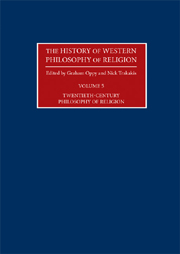Book contents
- Frontmatter
- Contents
- Editorial Introduction
- Contributors
- 1 Twentieth-Century Philosophy of Religion: An Introduction
- 2 William James
- 3 Henri Bergson
- 4 John Dewey
- 5 Alfred North Whitehead and Charles Hartshorne
- 6 Bertrand Russell
- 7 Max Scheler
- 8 Martin Buber
- 9 Jacques Maritain
- 10 Karl Jaspers
- 11 Paul Tillich
- 12 Karl Barth
- 13 Ludwig Wittgenstein
- 14 Martin Heidegger
- 15 Emmanuel Levinas
- 16 Simone Weil
- 17 A. J. Ayer
- 18 William P. Alston
- 19 John Hick
- 20 Mary Daly
- 21 Jacques Derrida
- 22 Alvin Plantinga
- 23 Richard Swinburne
- 24 Late-Twentieth-Century Atheism
- Chronology
- Bibliography
- Index
24 - Late-Twentieth-Century Atheism
- Frontmatter
- Contents
- Editorial Introduction
- Contributors
- 1 Twentieth-Century Philosophy of Religion: An Introduction
- 2 William James
- 3 Henri Bergson
- 4 John Dewey
- 5 Alfred North Whitehead and Charles Hartshorne
- 6 Bertrand Russell
- 7 Max Scheler
- 8 Martin Buber
- 9 Jacques Maritain
- 10 Karl Jaspers
- 11 Paul Tillich
- 12 Karl Barth
- 13 Ludwig Wittgenstein
- 14 Martin Heidegger
- 15 Emmanuel Levinas
- 16 Simone Weil
- 17 A. J. Ayer
- 18 William P. Alston
- 19 John Hick
- 20 Mary Daly
- 21 Jacques Derrida
- 22 Alvin Plantinga
- 23 Richard Swinburne
- 24 Late-Twentieth-Century Atheism
- Chronology
- Bibliography
- Index
Summary
In 1948, the BBC broadcast a debate between Bertrand Russell and Father Frederick Copleston on the existence of God (Russell & Copleston 1957). In that debate, Copleston claims: (i) that the existence of God can be proved by a metaphysical argument from contingency; and (ii) that only the postulation of the existence of God can make sense of our religious and moral experience. Russell replies by giving diverse reasons for thinking that these two claims are incorrect: there are various ways in which Copleston's argument from contingency fails to be persuasive, and there are more plausible alternative explanations of our religious and moral experience. While there are many significant changes of detail, it is fair to say that the debate between Russell and Copleston typifies exchanges between theists and atheists in the second half of the twentieth century, and it is also fair to say that Russell's contribution to this debate typifies the approaches of late twentieth-century atheists.
Speaking very roughly, we might divide the activities of atheists in the following way. First, some atheists have been concerned to argue that religious talk fails to be meaningful: there is no serious discussion to be had about, for example, the existence of God because one cannot even meaningfully deny the existence of God. Secondly, many atheists have been concerned to develop alternative worldviews to the kinds of worldviews that are presented in the world's religions; and, in particular, many atheists have been concerned to develop naturalistic worldviews that leave no room for any kinds of supernatural entities.
- Type
- Chapter
- Information
- The History of Western Philosophy of Religion , pp. 301 - 312Publisher: Acumen PublishingPrint publication year: 2009
- 1
- Cited by



